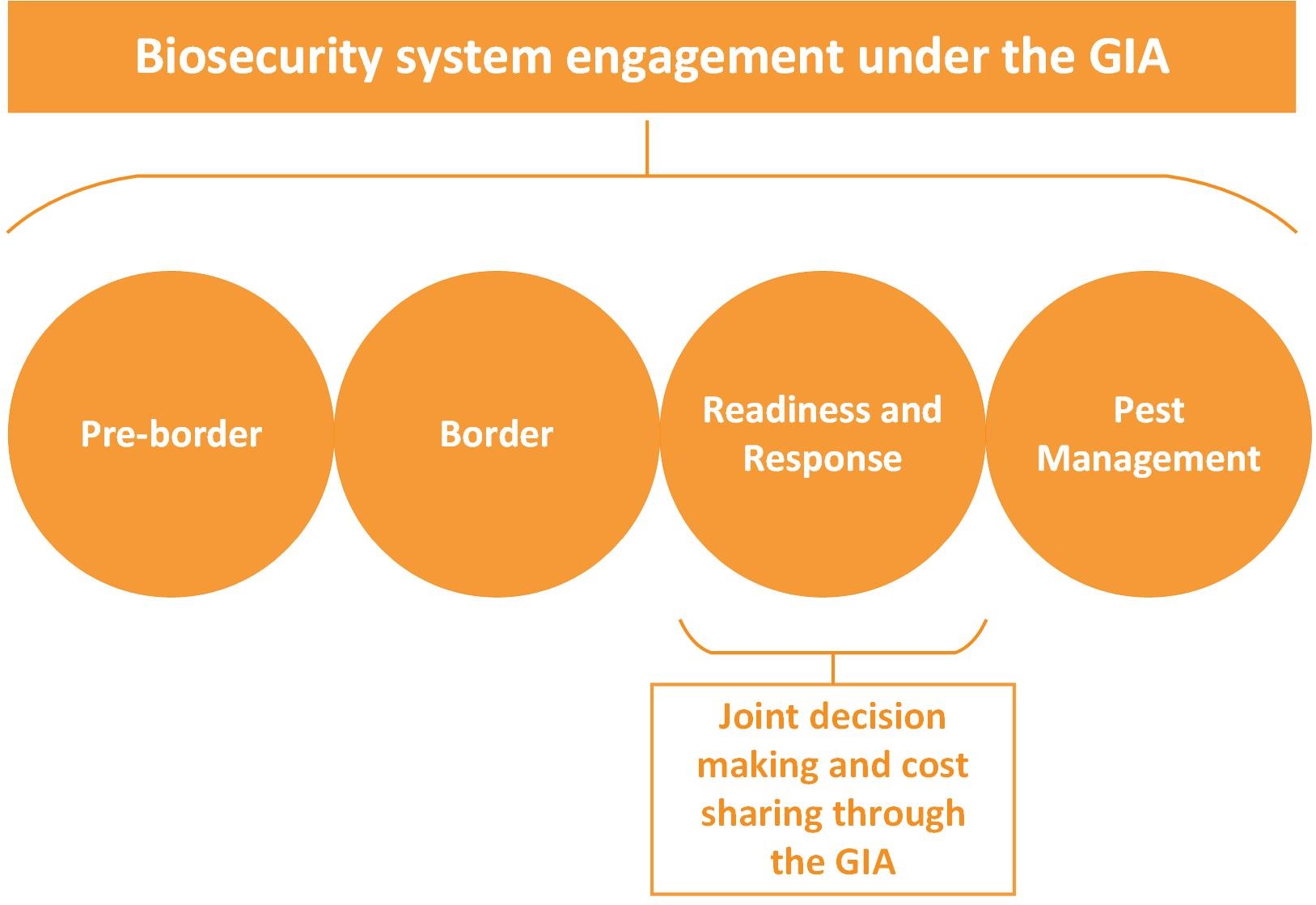The Biosecurity Act 1993 and the GIA Deed
The Biosecurity Act 1993 was amended in 2012 to include a framework that enables government and industry to work together in partnership through GIA to achieve the best possible outcomes from readiness or response activities by:
- Making joint decisions on biosecurity activities
- Jointly funding the costs of the activities in shares that take into account the public benefits and industry benefits that the activities deliver
The Act
The Ministry for Primary Industries administers the Biosecurity Act 1993. The Act provides a legal basis for excluding, eradicating and effectively managing pests and unwanted organisms, and its powers can be variously used by the Ministry, other government agencies, regional councils and pest management agencies. It is an enabling tool that provides a range of functions, powers and options for the management of risk organisms.
The Act was revised in 2012 to make provision for the Government Industry Agreement for Biosecurity Readiness and Response and the GIA Deed.
Management options under the Biosecurity Act are:
- Import and border controls aimed at effective management of risks associated with the importation of risk goods, including treatment of contaminated goods and craft
- Access to delegated powers for organisms declared unwanted organisms
- Exigency actions where other options are not adequate or available
- National pest management strategies (incursion response) that provide access to powers and rules by any organisation that is declared a pest management agency. Any response must be undertaken within those powers or rules, unless the strategy is subsequently amended or revoked in accordance with the Biosecurity Act
- Regional pest management strategies (mainly administered by regional councils)
- Enforcement of section 52 and 53 prohibitions (which make it an offence to sell, propagate, breed, release or display an unwanted organism or pest)
Part 5A of the Act (sections 100X-100ZH) provides the framework for the GIA partnership, including a Deed. It enables government and industry to work together in partnership to achieve the best possible outcomes from readiness or response activities by:
- Making joint decisions on the activities
- Jointly funding the costs of the activities in shares that take into account the public benefits and industry benefits that the activities deliver
More information
The GIA Deed
The GIA Deed establishes the basis for a transparent, consistent and equitable partnership between the Ministry for Primary Industries and industry to improve biosecurity readiness and response outcomes. It outlines the principles of the partnerships between the Ministry and each industry Signatory, describing the rights, legal obligations, roles, responsibilities and commitments of each Signatory for delivering the GIA outcomes. It sets out governance arrangements for decision-making, resourcing and operations, which support the implementation of the GIA Deed.
Deed Development
The Deed was drafted by a joint working group that included representatives from primary industry and government. The Group was assisted by a wider industry group, and stakeholders had the opportunity to comment on an exposure draft of the Deed in writing and at an industry workshop. Since it was first signed in 2014, the Deed has been amended three times by partners. Read more about the development of the Deed
Elements of the Deed
The Deed supports partnership between government and industry for:
- Engagement across the wider biosecurity system
- Joint decision-making and sharing of costs for agreed readiness and response activities for unwanted organisms

The wider biosecurity system
The GIA Deed recognises and acknowledges the effort and investment in the biosecurity system by Signatories and by the stakeholders they represent. New Zealand's biosecurity system spans offshore, border and on shore activities that mitigate the risk of introduction of pests and diseases and minimise the impact of established organisms on the economy, environment and the community.
The GIA Deed makes provision for Signatories to work in collaboration with each other and other stakeholders to improve biosecurity outcomes through enhanced engagement across the biosecurity system. This will be achieved through an increased knowledge and awareness of existing and developing biosecurity threats and ongoing development and maintenance of risk management measures and processes to address them.
Readiness
The GIA Deed provides for the development of operational agreements. These are contracts between parties to undertake activities that deliver an agreed biosecurity outcome that enhances readiness and/or response. They are negotiated by the parties involved and are binding to those parties. They make commitments to biosecurity outcomes that are over and above the minimum commitments in the Deed and are able to be cost-shared by the contracting parties. The GIA Secretariat can facilitate the negotiation and drafting of an operational agreement and facilitate ongoing engagement to support delivery of operational agreement outcomes.
More information
Response
When an unknown organism is identified within New Zealand, GIA Partners may choose to stand up a biosecurity response under the GIA provisions. An operational agreement will be developed (if there is not already one pre-agreed), and MPI and impacted industry parties will jointly run the response, make decisions about response activities, and fund those activities. Where it makes sense to do so, appropriately qualified industry resources will be deployed in the response alongside MPI staff and third-party providers.